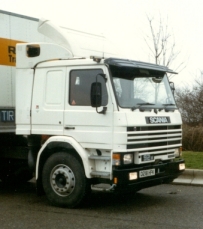

|
Speed Kills?
"Speed kills!", says the Government advertisement. It's a snappy little slogan, isn't it? The simple word "speed", and the highly emotive word "kills". Gold star and an extra days holiday for whoever thought it up. It's short, it's punchy, and it's attention-grabbing. What a pity it isn't true! If it were true, the safest roads in the country would be in built-up areas subject to 30mph limits, the most dangerous would be motorways, and the most dangerous drivers would be the traffic police, cutting great swathes through the population as they rush about in their high-powered cars. In fact, the opposite is true. For every 100 million vehicle kilometres travelled there are 96 injury accidents on urban roads, compared to just 11 on motorways, and the traffic police, considering the speeds they have to drive at, are incredibly safe. What's gone wrong with our slogan? The truth is that speed doesn't necessarily kill. Bad driving kills. Of course, bad driving can include driving too fast for the situation, but it's too simplistic to say that speed itself is dangerous. Speed in the wrong place is dangerous, but so is parking in the wrong place. 30mph past a school when the children are coming out would be dangerously irresponsible, but 70 on a quiet motorway is perfectly safe. If the motorway is busy, or it's chucking it down with rain, 50 could be too fast. The responsible driver knows when it's okay to wind it up, and when he should rein in the horses. Imagine, though, if some lunatic invented something which would allow you to race past schools, through town centres, down narrow rural roads, and even drive too fast on motorways when the conditions weren't right, but as soon as you were on a quiet stretch of motorway, in good conditions, restricted your speed so you couldn't even reach the speed limit, never mind exceed it. Imagine, also, that some other lunatic decided that these things should be fitted to vehicles driven by the safest drivers in the country. "No", you say, "That would be ridiculous". Well, the lunatics have taken over the asylum. The safest vehicles on our roads are lorries, (51 accidents per hundred million vehicle kilometres, compared to 94 for cars), but thanks to a decree by our masters in Brussels, they are now fitted with speed limiters. This does absolutely nothing to make our roads safer. You want to do 55 past a school? Certainly. The speed limiter won't stop you. Want to race down country lanes at 55? No problem. How about doing 55 on the motorway right up someone's backside in heavy traffic through roadworks in the pouring rain? Carry on. Want to travel at 60 on a quiet stretch of motorway in the dry? Oh no you don't! The limiter closes the throttle down, and 56 is all you get. A real contribution to road safety, huh? If this was the only effect of the limiter it would be be little more than an annoyance. There is, however, a more dangerous side to limiters. If you look at a tachograph chart from a lorry with a limiter, you'll see that, as long as the driver keeps his foot on the pedal, the limiter holds the speed at exactly 56. The speed hardly varies at all. This means that the driver has nothing to do except sit holding the wheel as the limiter drives the lorry slowly along. This causes the driver to become fatigued very quickly, and he stops paying attention to what he's doing, because, in effect, he's doing nothing. There's nothing to keep his brain engaged, and it's too easy then to start day-dreaming. In some cases he may even fall asleep. As I said, this dangerous nonsense has been inflicted on us by the European Union, and we all know what a brilliant record they've got for sensible and constructive legislation! We should be telling them what to do to improve road safety, not them telling us. In 1992, for example, seven people out of every 100,000 in Britain were killed in road accidents, compared to 12 in Germany, 18 in France, and 34 in Portugal. This makes British roads the safest in Europe, and probably the world. Motorways are the safest roads, and lorries are the safest vehicles on our roads. It's not difficult to deduce from these facts that a lorry on a British motorway is the safest vehicle in the world, so naturally the EU imposes a measure that affects only the safest vehicles in the world. They also, incidentally, force us to interpret the drivers' hours regulations in a way which allows you to drive for nine hours solid with only a fifteen minute break in the middle. Three cheers for the EU! The road accident statistics which were published earlier this year (see Transport News, August 1996, page 14, "CV fatalities buck the trend") are extremely disturbing. Although the overall number of road accidents is down as part of a continuing trend, the number of lorry drivers killed in 1995 was 24% higher than in 1994, (130, up from 105), and the number of PSV drivers killed was up a staggering 67%. So what's caused this worrying rise in deaths? The increase in traffic on the roads perhaps? The volume of traffic keeps rising, true, but if that was the reason you would expect to see a similar, if not worse, rise in the figures for non-professional drivers, but their death rate continues to decline. It must be something which affects only the professional driver. Have the hours regulations been relaxed in the last couple of years? No. Although some may argue that the rules allow drivers to work for too long, they've been the same since 1987, so that wouldn't account for the increase either. So what is it? What's happened in the last couple of years which only affects HGV and PSV drivers, and has led to all these extra deaths and serious injuries? Speed limiters. They've been fitted to most trucks and coaches in the last couple of years. Drivers on motorways now travel "on the limiter" for hours on end, and they now have nothing to do, as the vehicle is effectively driving itself. They stop paying attention to what's happening on the road, and they suffer more from fatigue, boredom and stress. In some cases they fall asleep, but even in less severe cases they will fail to spot potential dangers, or stray onto the hard shoulder or other running lanes. Lorry drivers are the most highly skilled drivers on our roads. I've always tried to be the best driver I can, even to the extent of passing the Institute of Advanced Motorists test on a car and an artic, and I was active in my local IAM Group for over ten years, but my advanced driving skills now count for nothing as most of the time I am now a passenger behind the wheel. My lorry is now being controlled by the limiter, not by me. The answer to this rise in fatalities is to restore control of lorries to their drivers. This means disconnecting their limiters, or at least resetting them to a speed where drivers won't be surrendering control to them. Driving is too complex a task to be left to electronic gadgets. Control of lorries should be given back to the safest drivers in the world. It can't be co-incidence that, in the absence of any other factors, the rise in deaths amongst professional drivers has happened at the same time as those same drivers started driving on speed limiters. The only drivers whose death rates have increased are those whose vehicles are now fitted with speed limiters, and this leads us to one inescapable conclusion: Speed limiters kill.
© Copyright 1997 Published in "Trucking International", May 1997 |
